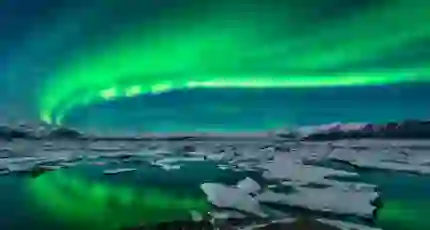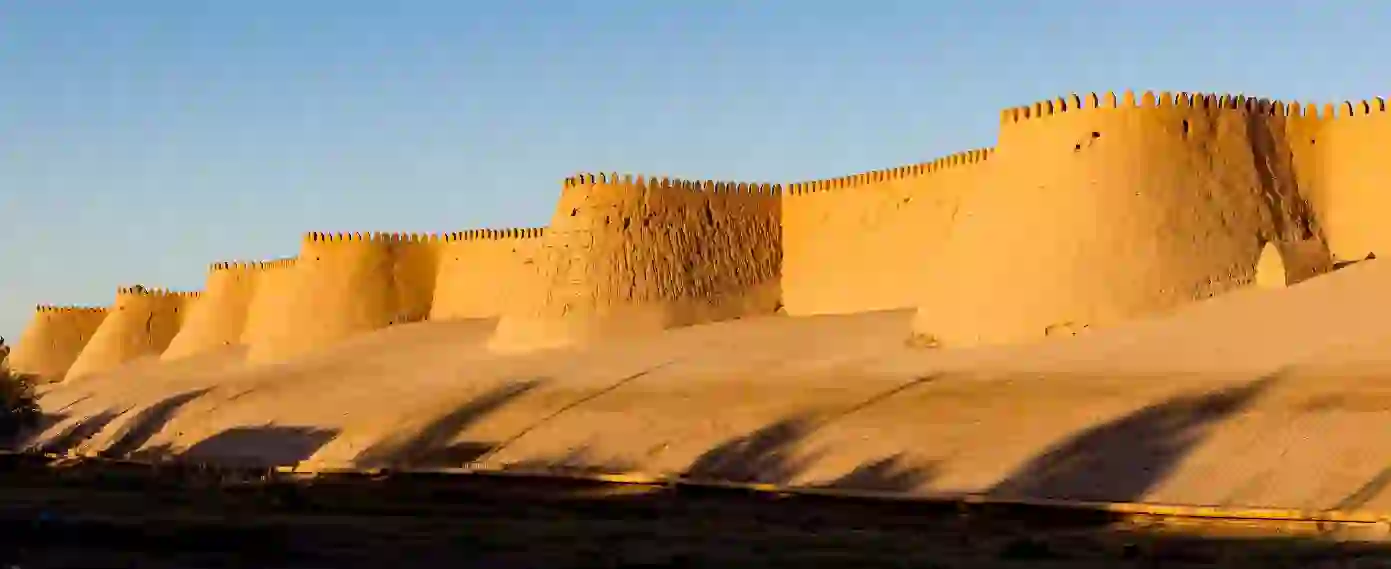
The best places to see the Northern Lights in the UK for free
Experts say that the sun’s solar cycle should reach peak activity in late 2024, making next year a standout period for viewing the incredible Northern Lights.
This build-up of solar activity, which increases the frequency and intensity of the incredible Northern Lights, is known as the Solar Maximum and it only happens in 11-to-15-year cycles.
And while the best places to see this illuminating display are typically near the Arctic Circle in countries such as Norway and Iceland – where you can visit on one of our specialist Northern Lights tours – next year’s extra burst of solar activity should increase your chances of catching a glimpse of the Northern Lights from the UK too.
Here’s our guide to the UK locations where the Northern Lights are expected to shine brightest, and top tips on how to prepare for your viewing experience.
Where to see the Northern Lights in the UK
Although sightings of the lights have recently been reported as far south as Kent, Dorset and the Isle of Wight, the locations you’re most likely to see the Northern Lights in the UK are remote, dark sky areas of Scotland, northern England, Wales and Northern Ireland, and they appear between late September and early April just a few times each year.
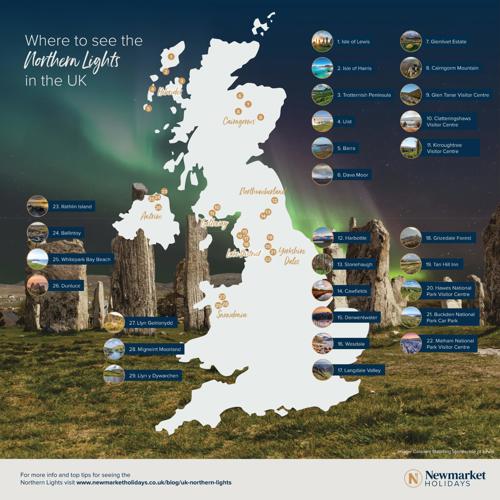
Where to see the Northern Lights in Scotland
Scotland has many locations that are superb for seeing the Northern Lights thanks to their northerly latitude and areas of low light pollution. These are some of the locations where you’re most likely to see the auroras.
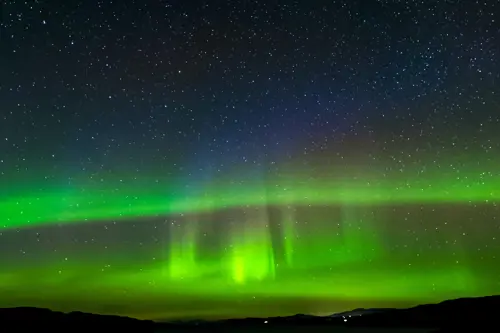
Isle of Lewis: With minimal light contamination and clear dark skies, the Isle of Lewis, in the northern part of the Outer Hebrides, offers a spectacular vantage point for viewing the Northern Lights.
Isle of Harris: Part of the Outer Hebrides, the Isle of Harris's stark beauty enhances the Northern Lights' spectacle in Scotland's far north.
Trotternish Peninsula: On the Isle of Skye, the Trotternish Peninsula's high vantage points offer breathtaking views of the auroras.
Uist: In the central Outer Hebrides of Scotland, Uist's unspoiled beaches provide a perfect natural backdrop for the Northern Lights.
Barra: The southernmost of the inhabited Outer Hebrides islands in Scotland, Barra's remote beaches offer a serene aurora experience.
Dava Moor: In the heart of Scotland, this moorland's vast, open skies provide an uninterrupted stage for the Northern Lights display.
The Cairngorms: Scotland's Cairngorms National Park, with its expansive and dark skies, provides a majestic mountain setting for viewing the Northern Lights in their full glory.
Glen Tanar Visitor Centre: Officially recognised as a Dark Sky Discovery Site, this centre in Aberdeenshire is a prime spot for aurora viewing, with minimal light pollution.
Clatteringshaws Visitor Centre: This secluded setting in Galloway Forest Park offers dark skies over tranquil Clatteringshaws Loch.
Kirroughtree Visitor Centre: Also in Galloway Forest, Kirroughtree provides clear, expansive skies, with dedicated stargazing areas ideal for Northern Lights displays.
Where to see the Northern Lights in England
Despite occasional sightings in the south, Northern Lights watchers in England have the best chance of seeing the sparkling auroras in the Dark Sky Discovery Sites of the Yorkshire Dales; in Northumberland, which is said to have the darkest skies in the UK, and in the Lake District, where there are excellent stargazing viewpoints. These are some of the best-known spots for watchers.
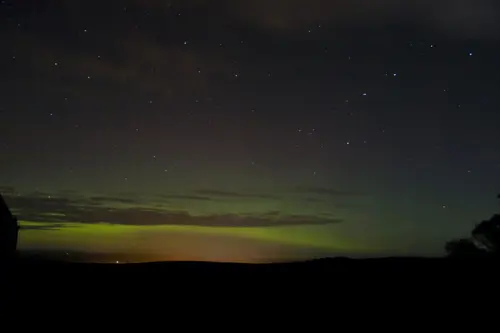
Harbottle: A quaint village in Northumberland, Harbottle's dark skies are away from urban light making it an excellent spot for aurora watching.
Stonehaugh: Set in Northumberland Dark Sky Park, Stonehaugh combines minimal light pollution and panoramic views for optimal aurora observation.
Cawfields: Located on Hadrian's Wall in Northumberland, Cawfields offers historical vistas where the auroras reflect off the Roman ruins.
Derwentwater: In the Lake District, the reflections of the Northern Lights on Derwentwater's calm waters create a stunning spectacle.
Wasdale: Home to England's highest mountain, Wasdale's remote location in the Lake District is perfect for uninterrupted Northern Lights views.
Langdale Valley, Cumbria: Nestled in the Lake District, the valley's minimal light pollution and clear horizons make it a stellar Northern Lights vantage point.
Grizedale Forest, Cumbria: Amidst the ancient woodlands, Grizedale offers a dark sky for viewers to catch the aurora's dance away from city lights.
Tan Hill Inn, North Yorkshire: As Britain's highest pub, Tan Hill Inn sits in an elevated, remote location, perfect for uninterrupted Northern Lights viewing.
Hawes National Park Visitor Centre, North Yorkshire: Located in the heart of the Yorkshire Dales, this spot provides expansive skies for a potential aurora display.
Buckden National Park Car Park, North Yorkshire: Set in the Upper Wharfedale, the dark skies here serve as an excellent backdrop for the aurora borealis.
Malham National Park Visitor Centre, North Yorkshire: The rugged landscape and dark skies of Malham Cove area offer a dramatic setting for Northern Lights watchers.
Where to see the Northern Lights in Wales
Remote Snowdonia is an 823-square-mile Dark Sy Reserve that offers the best chance to see the light in Wales.
Llyn Geirionydd, Conwy: Tucked away in Snowdonia National Park, Llyn Geirionydd's reflective lake waters amplify the auroral display in a tranquil Welsh setting.
Migneint Moorland, Gwynedd: This remote and protected Site of Special Scientific Interest offers clear, dark skies away from urban light interference, making it a prime spot for light gazers.
Llyn y Dywarchen, Gwynedd: Overlooked by the Snowdon range, the dark skies above Llyn y Dywarchen are an ideal canvas for the bright colours of the aurora.
Where to see the Northern Lights in Northern Ireland
Rathlin Island, Antrim: This remote island off the coast of Antrim offers an escape from artificial lighting, with coastal views that provide a stunning backdrop for the auroras.
Ballintoy, Antrim: Known for its rugged coastline and small harbour that looks north, Ballintoy is a picturesque spot where the Northern Lights reflect off the Atlantic Ocean.
Whitepark Bay Beach, Antrim: The sweeping sandy beach at Whitepark Bay is north-facing and offers wide, unobstructed skies ideal for watching the aurora borealis.
Dunluce, Antrim: The iconic medieval ruins of Dunluce Castle offer a historic and dramatic setting for aurora enthusiasts along the North Antrim coast.
Top tips for seeing the Northern Lights in the UK
If you’re planning a trip to a remote location, you’ll want to maximise the chances of seeing the incredible display.
Here are tips for getting the very best views, from our expert guides in the Arctic Circle:
1. Get free help: Use Aurora Watch UK (link: https://aurorawatch.lancs.ac.uk/) for alerts when the Northern Lights are most active and visible from the UK. Follow local astronomy clubs or societies on social media for real-time updates and tips from seasoned aurora watchers in your area.
2. Check the weather: A cloudy night will hide the display.
3. Look for dark skies: Head to a beach or an open, rural area to avoid light pollution from houses or industry.
4. Map out your spots: Have a list of the best viewing spots handy, so you can quickly relocate if your first choice is unsuitable due to weather or light pollution.
5. Rest well: The best time for seeing the lights is between 10pm and 2am.
6. Plan for the long haul: Bring a comfortable chair or a blanket; sightings can sometimes take hours, and you’ll want to be patient without getting cold or tired.
7. Photography prep: If you plan to capture the lights, use a tripod, and familiarise yourself with your camera's manual settings – long exposures are essential.
8. Stay power ready: Ensure your phone and camera batteries are fully charged, and consider carrying extra power banks or batteries, especially in cold weather which can drain them faster.
Want an easier option? Northern Lights tours in the Arctic Circle
Aurora activity is unpredictable and very dependent on weather conditions. If you want to significantly increase your chances of a successful sighting, our advice is to head north to the Arctic Circle. Here remote Iceland and Norway provide some of the world's best viewing spots, along with thrilling activities that keep you occupied during the hours of hopeful waiting.
Find out more about our own Northern Lights escorted tour holidays to the Arctic Circle.

